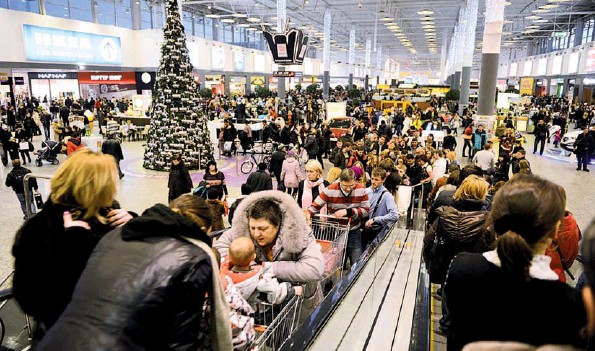The adaptability of people is consistently under-estimated by experts
 Monday, January 14, 2013 at 10:06AM
Monday, January 14, 2013 at 10:06AM 
Pair of NYT stories from earlier in the month. Both speak to the realities and myths of people's adaptability.
First one is about how Latvia (a place I very briefly visited back in the 1980s when it was still back in the USSR) and it talks about how, during the Great Recession, Latvians were able to handle the harsh austerity (sort of crew cut instead of the usual haircut).

Second one is about how Russians are already mall fanatics. I remember Zbig Brzezinski saying, when the Wall fell, that it would be decades and generations before Russians figured out markets, etc. It was all so godawfully patronizing (as only a Pole or Ukrainian might be WRT Russians).
My point in citing them together: people are amazingly adaptable. Latvians remember worse days (like your Great Depression parents or grandparents) and so they are unfazed, but Russians have no trouble slipping right into being material boys and girls (as did the Latvians for a while there and as they will again soon).
Americans have this tendency to believe we're the only adaptable people in the world, and it's true on some points: on religion and "sacred soil," we are freakishly flexible. If they declared that the US was being moved to Canada next week, most of us would pack up and go, because it's the freedom rule-set that we're most addicted to, with darn near everything else being negotiable.
Yes, the world is still full of traditional cultures wedded to sacred soil and religious identities (like . . . fuh-ever!), but given even the slightest chance, man, will they ever break out of their shells - and I mean everybody. Sure, it's the kids who always lead the way, but guess what? Traditional societies are youth-skewed (all that baby cranking) and they often feel the huge need to BE traditional precisely because there are all those young minds that need bending. And yes, when the change comes, it does seem like the "end of X civilization," just like when Elvis and The Beatles and Stones showed up. And yes, many prices will be paid and much of the culture transformed and made that much harsher by all that individualism (to include the freedom to be miserable), but people really are the same all over - when given the chance. No, that expression doesn't come in some archetypal "American" way. At the end of the day, Russians are still Russians and Chinese are still Chinese (go figure!), so the applications are always different.
It's just that the freedom impulse (far more economic in nature than political) is the basically the same: I get to do what I want, when I want, how I want, buying what I want, etc.
So no, no 50-year transformations required on the economics. It's the politics (single-party states in particular) that go slow.
That's what the military and intell people NEVER understand. They think the politics (aka, intentions) can go like "SNAP!" while the economics will never change (or capabilities change slowly).
Truth is, it's entirely the other way around. And all that economic freedom is what drives the super-fast technology adaptations (meaning HOW people use tech is nearly always more revolutionary than the tech itself).
Just my 2 cents .....
 Russia,
Russia,  global middle class,
global middle class,  global trends,
global trends,  globalization | in
globalization | in  Citation Post |
Citation Post |  Email Article |
Email Article |  Permalink |
Permalink |  Print Article
Print Article 









Reader Comments (3)
As another data point, consider the failure of strategic bombing campaigns as "war against morale". That didn't work for Britain, Germany, Japan or North Vietnam.
It's an interesting point. I'd love to see this idea applied to the PRC and its go slow program of democratization.
Perhaps, but people differ in the adaptability. Two examples: 1. I was just in China for 4 weeks in Dec-Jan and visited many power plants and engineering companies promoting better controls (particularly lower NOx pollution.) and in 10 years the responses haven't changed one bit. They always say the same things, ask the same question and yet in the vast majority of circumstances they go back to doing the same things that they have been doing for many years that they know don't work, because "everybody else in China does things that way.:N Example 2: as a Western person that speaks Chinese I am always asked the same two questions, in the same order, using exactly the same words. 1. What country are you from -- Na ge Guo Jia? - 哪個國家? 2. How long have you been in China? - Lai Zhong Guo Duo Jiu? 來中國多久1 When I go to Taiwan and Hong Kong, and to a certain extent Fujian and Guangdong provinces his isn't what I hear, but in most of China this is certainly the case. My conclusion - encourage robotic conformity and that's what you tend to get.